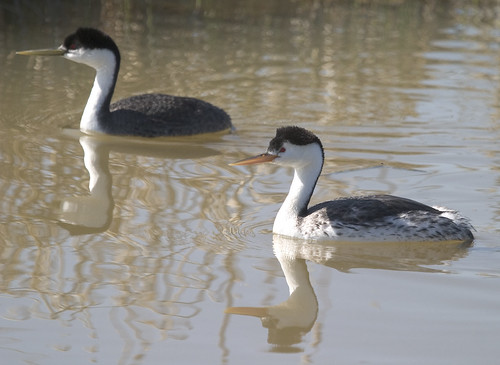tags: grebes, birds, Image of the Day
Clark's Grebe, Aechmorphus clarkii, in the foreground with a Western Grebe, Aechmorphus occidentalis, behind. Both were photographed on the Bear River Migratory Bird Refuge (north end of the Great Salt Lake) in the spring of 2005. Similar birds, but the field marks are straw-yellow bill (Clark's) cf. greenish-yellow bill (Western); white feathering around the eye (Clark's) cf black (Western), and whiter flanks on the Clark's Grebe. This pair of birds was hanging out together, and that was not unusual, making one wonder if splitting these into two separate species (which occurred sometime in the 1980's) was really justified. Apparently they do hybridize as well.
Image: Dave Rintoul, KSU [larger]


Aechmophorus grebes have become one of my favourite examples for the difficulties of defining a 'species'. Apparently the two species tend to keep separate early in the breeding season, but as the season gets closer to the end (and, no doubt, those individuals that haven't yet found a mate become more desparate) they apparently become more willing to accept a mate from the 'wrong' species.
Nuechterlein, G. L., & D. Buitron. 1998. Interspecific mate choice by late-courting male western grebes. Behavioral Ecology 9: 313-321.
They sound just like humans to me!